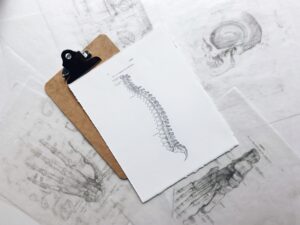The importance of spinal health grows as you age – your bones may become weaker and subject to damage. Over time, deformities may develop due to age-related strain on the back. Adult degenerative scoliosis is a condition in which there is a side-to-side curve of the spine that is caused by degenerating facet joints and intervertebral discs. The degeneration progresses slowly over time, resulting in spinal asymmetry.
Symptoms of adult degenerative scoliosis vary, from dull backaches to excruciating sciatica that makes walking difficult or impossible. Common signs and symptoms include:
- Gradual pain onset that typically begins as stiffness or a dull ache in the lower back
- Intense pain first thing in the morning that improves after moving around
- Comfort sitting rather than standing or walking
- Change in posture
These symptoms can get worse over time and impede your ability to conduct daily activities. If the degeneration and/or curvature advances enough, it may result in: (1) radicular symptoms, such as weakness, numbness, tingling, and/or pain that radiates from the lower back into the glute, thigh, calf, and/or foot; (2) neurogenic claudication, typified by muscle cramps and/or leg pain when walking, or (3) severe spinal deformity, characterized by a spinal curve of 90 degrees or more.
Other forms of scoliosis include: (1) idiopathic scoliosis, which is the most common form of scoliosis. It develops without a known cause but is theorized to be linked to genetics, and (2) neuromuscular scoliosis, which is caused by abnormal muscle or nerve growths and is generally seen in individuals with spina bifida or cerebral palsy.
A physician will review your full medical history, perform a physical exam, and request imaging studies to evaluate whether or not you have degenerative scoliosis. Function exams ensure that you have degenerative scoliosis and not a separate issue such as a faulty posture. These exams include active movement tests of the cervical, thoracic, and lumbar spine; the Adam forward bend test; the Cobb angle; pulmonary function tests, and; the scoliometer, which measures the axial trunk rotation.
If you receive a confirmatory diagnosis, or if you suffer from back problems in general, there are a few things that you can do to protect your spinal health.
Physical Therapy and Rehabilitation for Spinal Health
Whether you have symptoms of adult degenerative scoliosis, or you have persistent back pain that interferes with your normal life, physical therapy is a great option for getting relief. The rehabilitative goals of physical therapy include alleviating pain, improving mobility, and informing you on how to maintain care at home.
Chiropractic care is a form of physical therapy that focuses on the spine. Chiropractors use manipulative techniques to relieve stress and pain from the body. Although spinal manipulation is at the core of chiropractic care, other treatments include ergonomic training, postural and exercise education, and massage therapies. Ergonomic training will teach you the correct way to walk, sit, and stand to limit the amount of stress that is placed on your spine.
Chiropractors help provide relief by performing manipulations on your spine. They provide therapies that will improve your form and mobilize your joints, thereby improving the overall function of the joints. By improving mobility, you may have less pain, more comfort, and better posture. Chiropractors can also help combat the further deterioration of your spine.
If degenerative scoliosis goes untreated, it can lead to severe, long-term issues. People with scoliosis generally suffer from pain in the neck, shoulder, back, and buttocks, as well as reoccurring injuries and sciatica. In more severe cases, scoliosis may diminish lung and heart capacity or cause physical disability.
If you have adult degenerative scoliosis, a chiropractor is an integral part of your care team. Chiropractic care offers a gentle way to prevent, combat, and halt the progression of scoliosis. At Integrative Chiropractic, Dr. Ryan Russell uses corrective chiropractic care and active rehabilitation to help decrease back pain and improve posture. The goal of your treatment is to restore hope, strength, and spirit through a holistic treatment approach.
Have you had enough with your pain? Are you looking for a safe way to treat scoliosis? Contact us at 205-637-1363 to schedule your appointment with Dr. Ryan Russell today!








